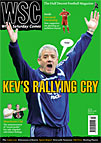 Manchester United proclaim their finances to be in excellent good health. Yet, as Ashley Shaw reports, with the Glazers’ debt and a stuttering global economy the figures simply don’t add up
Manchester United proclaim their finances to be in excellent good health. Yet, as Ashley Shaw reports, with the Glazers’ debt and a stuttering global economy the figures simply don’t add up
Manchester United’s recent announcement of record profits fooled few in the media and has only reignited anti-Glazer feeling among supporters. Timed to capitalise on the feel-good factor at the club in the wake of a successful 18 months during which they regained the title and discovered they had within their ranks a genuinely world-class player, the press conference only succeeded in throwing up more questions than it answered.
The headline grabbing figures look fantastic: turnover up 21 per cent to £245 million, pre-tax profits up 93 per cent to £59m and post-tax profits of £42.8m. Yet the reality, once debt repayments (cunningly transferred to the Glazer vehicle “Red Football”, and thus omitted from the headline figures) of £60m per year are factored in, leave a loss of £18m during the 2006-07 tax period.
The failure of this PR exercise can be gauged by the following day’s headlines, which focused almost entirely on the ongoing impact of the debt. Even mainstream writers such as the Express’s Harry Harris felt moved to write articles entitled: A Glazer Nightmare.
The announcement, designed to catch the attention of the football world following Arsenal’s chart-topping accounts last year, also included a bullish reiteration that Cristiano Ronaldo was not for sale and an unapologetic defence of the Glazers. This was a confident David Gill, finally emerging from low-profile announcements and excuse-laden explanations for his paymasters with a full-on charm offensive on behalf of them. Within days, the plan backfired.
The assumption was made that the majority had finally accepted the Floridians. Until the announcement, dissent had been rare and the LUHG (Love United, Hate Glazer) campaign had seemingly petered out. Gill admitted that there remained a militant element within the support who “will never be persuaded that the takeover was a good thing, not even if we won ten Champions Leagues in a row” and went on to extol the virtues of private ownership. “I wouldn’t disagree with the view that it would have been unimaginable to sign those four players [Tevez, Nani, Hargreaves and Anderson] if we had still been a plc,” he said. Leaving aside the murky terms of the Tevez loan, all four were “purchased” after July 1, 2007 and therefore outside the 2006-07 figures he was reporting. Gill also ignored the signings of Ferdinand, Rooney, and Verón by the old plc, all within the £25-£30m bracket, a range seemingly beyond the current owners’ budget.
Until the press conference, the club’s PR machine had looked to recover the ground lost following the Automatic Cup Scheme debacle, when season-ticket holders were compelled to buy tickets for all cup matches. Initial plans for the Munich commemoration were also met with widespread supporter approval. However, the appearance of the AIG logo on an otherwise outstanding tribute to the Babes on the glass wall of the East Stand, depicting “The Last Line-up” in Belgrade, outraged many. Gill felt compelled to defend United’s main sponsor and the logo was not removed, but supporters question the insurance company’s right to be linked with that team in such a way.
Within days the board’s new-found confidence seemed misplaced as threats were daubed on an exterior wall at Gill’s leafy Cheshire home, while Tarantino-inspired “Kill Gill” graffiti appeared around Old Trafford. A subsequent attack on AIG’s Manchester offices also highlighted a growing confidence within the militant element. Of course the main concern remains the £60m-a-year debt repayments, but the ticket price hikes and the ACS have not helped, although Gill did announce that the latter would be “tweaked” in response to criticism.
The reality of United’s balance sheet is that far from being in a healthy position, the club could be caught in the credit crunch currently convulsing the global economy. If the financial year goes as badly as expected and the Glazers press on with ticket price rises, a drop in the number of season-ticket renewals could leave the Floridians unable to refinance, increasing losses. They would then be forced to look at the sale of key assets: principally naming rights to the stadium, their position regarding the Premier League’s TV agreement or, worse, accept the best offer for the Premier League’s top scorer. Despite Gill’s protestations, these options remain on the table.
So, far from announcing a record profit, the board should have fielded awkward questions concerning the Glazers’ husbandry of a club hitherto profitable, debt-free and so far ahead of their English rivals that they were worth more than the second, third and fourth richest teams combined. In two-and-a-half years under the Glazers, United have gone from being top of the pile by some distance to resorting to accountancy tricks to reclaim top spot. The ludicrous situation is highlighted by annual payments of £60m for the privilege of being owned by a family with little affection for or knowledge of the club – even in the twisted logic of today’s Premier League, that takes some beating.
From WSC 253 March 2008